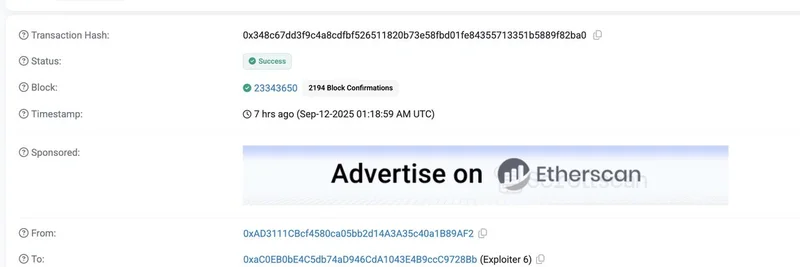In the ever-unpredictable crypto space, where fortunes flip faster than a meme token pump, a recent incident has everyone talking. JP, known on X as @jpthor, co-founder of THORChain and Vultisig, just got hit with a massive scam—losing around $1.3 million to what appear to be North Korean hackers. And the kicker? There's some serious irony involved, as pointed out by on-chain sleuth ZachXBT.
According to a tweet from blockchain analytics firm Lookonchain, JP fell victim to a clever "conference call scam." These scams often involve fraudsters posing as legitimate contacts during video or audio calls, tricking victims into revealing wallet seeds or approving malicious transactions. In JP's case, it led to a hefty loss of funds, spotlighting how even seasoned pros in the industry aren't immune to social engineering attacks.
But here's where it gets juicy. Lookonchain highlighted an ironic twist: ZachXBT claims that JP and his projects have actually benefited from helping these same North Korean hackers launder their ill-gotten gains. THORChain, for those new to it, is a decentralized exchange (DEX) that enables cross-chain swaps without relying on wrapped assets or centralized custodians. It's powered by its native token, RUNE, and has been a go-to for liquidity in the DeFi world. Vultisig, on the other hand, is a security-focused wallet solution aimed at protecting user assets.
The tweet links to an Etherscan transaction, which shows a bounty offer sent to the exploiter's address. The message reads: "IDM: Bounty offer: Return $THOR for reward. Contact [email protected] or THORSwap discord for OTC deal. No legal action if returned within 72h." It's essentially a plea to the hacker to return the funds in exchange for a reward, with a 72-hour window to avoid legal repercussions. This on-chain communication is a common tactic in crypto hacks, turning the blockchain into a public negotiation board.
ZachXBT, a well-respected investigator in the crypto community famous for exposing scams and tracking illicit flows, chimed in with even more context. In a reply, he noted that in a recent documentary about the Bybit hack—another major crypto heist attributed to North Korean groups—JP defended the Democratic People's Republic of Korea's (DPRK) "right" to hack and exploit teams. This stance raises eyebrows, especially given the allegations that his platforms have facilitated laundering for these actors.
North Korean hackers, often linked to state-sponsored groups like Lazarus, have been a persistent threat in crypto. They've pulled off some of the biggest hacks, funneling billions into funding regimes through sophisticated laundering techniques involving mixers, DEXs, and cross-chain bridges. If ZachXBT's claims hold water, it paints a picture of a complex web where security builders might unwittingly—or otherwise—aid the very threats they're fighting against.
This story underscores a harsh reality in blockchain: no one's safe, and the lines between victim, enabler, and innovator can blur quickly. For meme token enthusiasts and DeFi degens alike, it's a reminder to double-check every call, link, and transaction. Stay vigilant out there—scams evolve as fast as the tech itself.
If you're diving into meme tokens or broader blockchain news, keep an eye on platforms like THORChain for their role in liquidity, but always prioritize security. What do you think about this ironic turn? Drop your thoughts in the comments below.
Check out the original tweet from Lookonchain for the full scoop.



